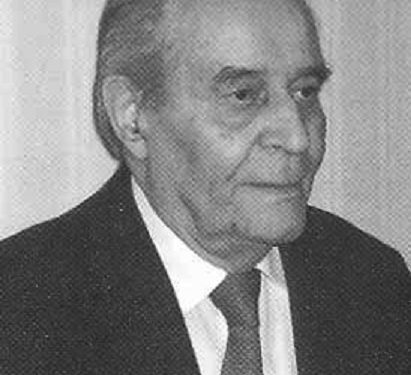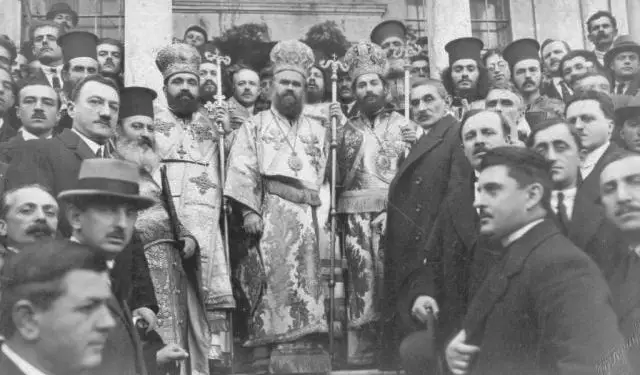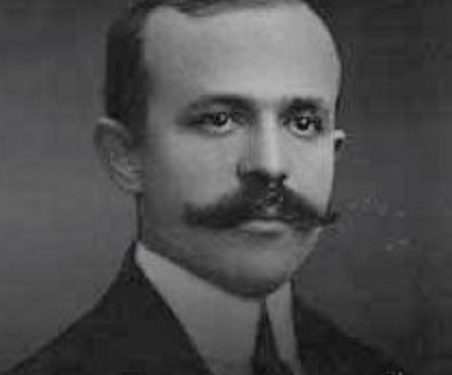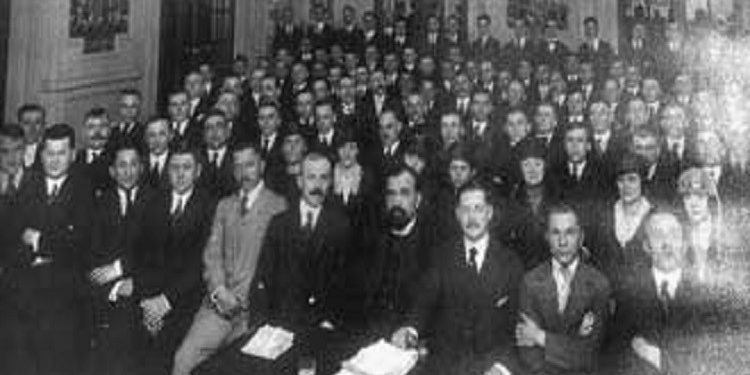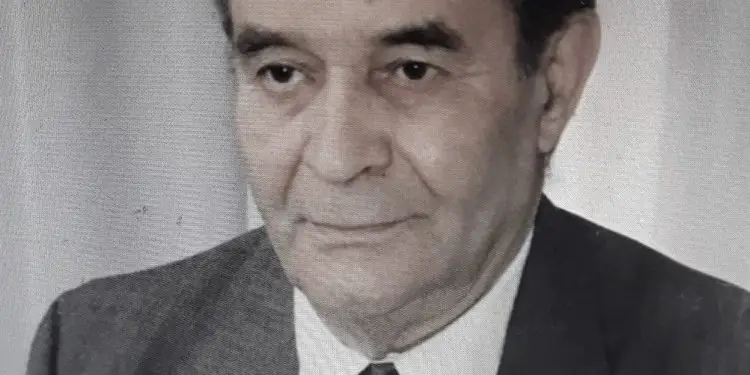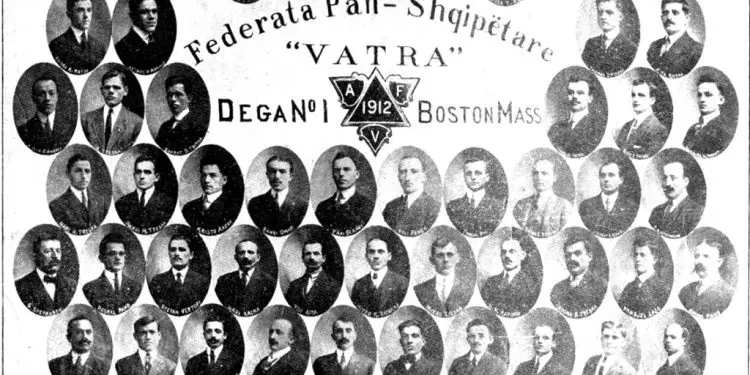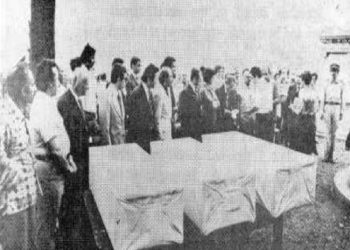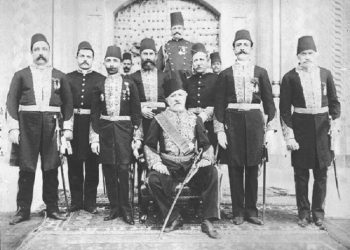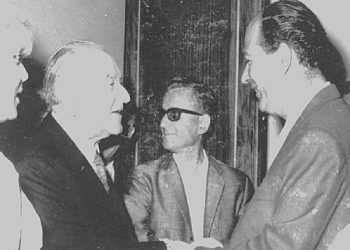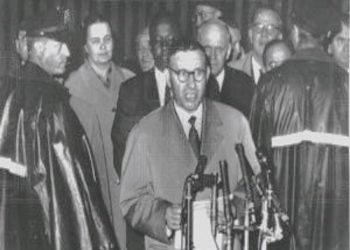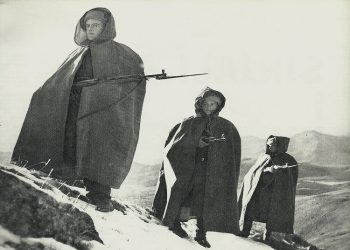From Agim Musta
Memorie.al / Kristo Kirka, the last Albanian renaissance, died in Burrel prison on April 28, 1955. But who was Kristo Kirka, that the communist dictatorship took revenge on him so cruelly? He was born in Korça in 1883, in an honest merchant family, protected by the feeling of Albanianism. He was raised with love for the Albanian nation by his father, Dhimiter Kirka, and uncle, Ciko Alla, one of the 9 arhondas, who ruled Korça at the beginning of the 19th century. He graduated from the Greek gymnasium, but remained an opponent who disagreed with “megalomania” and “panhellenism”. For revenge, he was sued by the Turkish authorities, as a devoted activist of the Albanian cause.
To escape prison and exile, in 1905, at the age of 22, he went into exile and settled in the USA. He became one of the most prominent activists in the Albanian colonies of America and was put at the head of the movement for the creation of the Albanian Autocephalous Church. In 1908, together with the patriots; Sotir Peci, Vangjo Mileri, Spiridon Huani and Gaqo Dushi, go to New York, to witness the handing over of Fan Noli to the priest. After this great victory of the Orthodox faith, which became a precursor to the independence of Albania, Kristo Kirka was elected the president of the Albanian society “Besa – Besë” and developed intense political activity.
In 1913, the pan-Albanian Federation “Vatra” launched Christ Church with a mission to meet with the leaders of Albanian societies in the Balkans. From Romania, he returns to his homeland and, at the head of a delegation, goes to Durrës to welcome Prince Vid, the King of Albania. In the autumn of 1914, he picked up his rifle and went to the front of the warriors of Themistoklis Gërmenji, to protect southeastern Albania from the Greek Andarts. The freedom fighters, brave as they were, were forced to retreat before the regular Greek army. Kristo Kirka describes the black day when the Greeks invaded Korça in this way:
“It was evening. After I had made a piece of road, I stopped and held my breath. I was leaving behind my city, which I loved so much. The city seemed sleepy to me, with the shadow of death, like a quilt thrown over it. My heart trembled with grief. The next morning I saw that the Greek army was coming down from the Morava Mountain and entering Korça. The ground turned, my vision went dark, my knees were cut, and my legs couldn’t hold me anymore. Hot tears flowed down my cheeks. I didn’t erase them; I let them flow, to ease my soul. With pain in my heart, I took the escape route towards Vlora. As I walked without speaking, I felt a knot of poison occupying my throat. My chest was burning with fire…”!
Back to America again. Together with Noli and Konica, he defends the Albanian issue more fervently, with pen and mouth. He fought with fists in the middle of New York with the Greek chauvinist demagogues, who preached that all the Orthodox of Albania is Greek.
In 1921, together with Noli, he was sent to Albania as a representative of Albanians in America. In the same year, he was elected deputy of Korça together with Noli in the first Albanian Parliament, where he defended the right and the truth. He works closely with Noli, Mehmet Konica, Mit’hat Frashëri, Faik Konica, Ahmet Zogu, Peshkop Koleci, Sotir Peci, dr. Turtullin, Father Gjergj Fishtë, Luigj Gurakuqin, Aqif Paşan, Qazim Kokoshin, Dhimitër Kicimbran, Hysni Currin, and other prominent patriots of that time, for the creation of a People’s National Party, the program of which was drawn up by Kristo Kirka himself, with national idea and one of the most progressive of the time.
Kristo Kirka, was one of the initiators for calling the Congress of Berat, in September 1922, where the Autocephaly of the Albanian Orthodox Church was announced. Takes the road to Istanbul, at the head of a commission, to ask Patrick for the recognition of the Albanian Autocephalous Church by the Patriarchate of Istanbul. For all these activities, he was honored by the Albanian Church with the decoration “In memory of the activity for the benefit of the Albanian Autocephalous Church”!
In 1924, Kristo Kirka was appointed consul of Albania in Boston and later in New York. From 1925 to 1929, Kristo Kirka held the office of chairman and vice-chairman of the Pan-Albanian Federation “Vatra”. In 1933, he returned to his homeland with his family and in 1935, he was appointed sub-prefect in Himarë. The province of Himara had become problematic for the Albanian state, after a handful of people who pretended to be more Greek than the Greeks, demanded the opening of Greek schools and special privileges in the province of Himara.
Christo Kirka, with the wit and determination that characterized him, burned the diabolical plans of the agents of Panhellenism in their hands. In 1937, the sub-prefect was transferred to Bilisht, where he gained the respect and love of the people of Devolli. During the Italian-Greek war, when the Greek army entered the city of Korça, in December 1940, Kristo Kirka was arrested by the occupying authorities and interned in the Kosinja camp, near Athens.
During the years 1942 – 1944, Kristo Kirka was appointed mayor of Korça, a task he performed with high civic responsibility. Joins the “National Front” and is elected a member of the Korča District Committee. The communists, knowing the sympathy that Kristo Kirka enjoyed among the people, tried to attract him to the so-called National Liberation Movement, which was nothing but a trap and a deception for the establishment of a Slavic-communist dictatorship in Albania. He scornfully rejected the invitation they sent him to participate in the Congress of Permet. The diabolical machinations of the communists did not tempt the experienced patriot, Kristo Kirka.
When the communist parties entered Korça, in October 1944, the first to be handcuffed was Kristo Kirka, that Kristo, who sacrificed his whole life for Albania and who was called a traitor and enemy of the people. The commander of the city’s garrison, Beqir Balluku, goes to the prison to meet Kristo Kirka and to get to know the man whose fame has turned into a legend. With the pride of the winner, Beqir Balluku addresses Kirka with these words: “I gave all my life and wealth for Albania, but fate punished you, because you did not come with the communists”.
And Kristo Kirka, haughty, answers, “I performed my duty to the motherland with honor and heart.” I have no regrets at all.” For the sake of the truth, it must be said that Beqir Balluku ordered the release of Kristo Kirka from prison, after 12 days of arrest. He returns home and imprisons himself, feeling the danger hanging over his head like the sword of Damocles.
In June 1946, he was arrested for the second time, but this time, he will never return to his beloved Korça, neither alive nor dead. Those who had neither religion nor homeland sentenced him to 20 years of imprisonment “in the name of the people”, as “enemy of the people”. The decision of the unjust sentence, given by the gravediggers of the nation, he received without batting an eyelash, recalling the words of the great revivalist, Sami Frashëri, that “When criminals are exalted, honest people rot in prisons”.
The news of the conviction of the revivalist Kristo Kirka deeply shocked the Albanians of America. Fan Noli himself intervened with the government of Tirana for his release, but Noli’s request was rejected by the servants of Belgrade, who had taken over the disappearance of the Albanian nationalists. Kristo Kirke, who had spent 60 years, shackled hands and feet, was sent to die in the hellish prison of Burrel – the grave of the Albanian intelligentsia. Thus began the half-century ordeal for the Kirka family. In June 1946, his son, Niko Kirka, a high school graduate in Korça, was arrested.
They nationalize their house and kitchen, even their spoons and coffee cups. After brutally torturing Niko Kirka in the cells of the Security, they sentenced him to 8 years in prison “in the name of the people”. They send him to the extermination camp of Vloçishti, to work as a slave in the draining of the Maliqi marsh. Neither sinking up to his navel in swamp mud, nor leeches crawling up his legs to suck the blood, nor being shackled to posts under the scorching sun, nor hunger and the cold of winter, bent Niko Kirka. He became a symbol of resistance, for thousands of young Albanians, who suffered innocently in the prisons and camps of the red dictatorship.
The communist persecution of the Kirka family continued for half a century. Kristo Kirke’s wife, Androniqi, was fired along with her two daughters. They were forced to work alone, in hard physical labor. Meanwhile, Kristo Kirka, who had spent about a decade in the black prison of Burrell, was living his last days, among fellow sufferers and friends. They respected and cared for him as if they had their real father. He was in agony when his beloved daughter, Catherine, went to visit him in that place of misery.
The day after that day, April 28, 1955, the apostle of Albanianism, Kristo Kirka, passed away. No “ah” and no curse came out of his mouth in the last moments. His lifeless body was buried in the common pit, behind the prison, near the cherry tree, where several hundred ex-prisoners, who loved Albania more than their lives, were buried. His former co-sufferer, the poet Arshi Pipa, deeply moved by the tragic death of the last Albanian Renaissance man, dedicated an elegy to Kristo Kirka, some stanzas of which are presented below:
“The old ensign died!
How the shepherd died with honor,
Pure, devoted
He looked at her and bowed once
Between the cells, I came to Burrell
with the violence of the traitor,
with the stain of the criminal
on the forehead of the patriot
He didn’t speak, he didn’t curse.
But when it came down to it,
We heard how easily he complained:
“For the flag!…For the homeland!”
The persecution of the Kirka family continued without interruption. The only son of Kristo Kirka, Niko Kirka was exhausted by prisons and forced labor camps for 8 consecutive years. Even when he finished his sentence, Nikos did not stop, going from one construction site to another, followed by the living ghosts of the Security of the Enverist state. The fall of the Berlin Wall and the execution of the dictator Ceausescu shook the rotten Albanian communist regime to its foundations.
In July 1990, the embassies of Western countries in Tirana were occupied by thousands of unemployed and persecuted by the communist regime. In December of that year, the last “sandcastle” of communism in Europe, Albania, collapsed due to the demonstrations of young people and the long-suffering Albanian people. Niko Kirka with his family made his way to the USA, where he was born 65 years ago. He settles in New York, where he actively participates, with writings and speeches, for the defense of the Albanian issue.
When the stone will find its place in Albania, the name of Christ Church will be written in golden letters, in the Pantheon of the nation’s martyrs. Memorie.al




